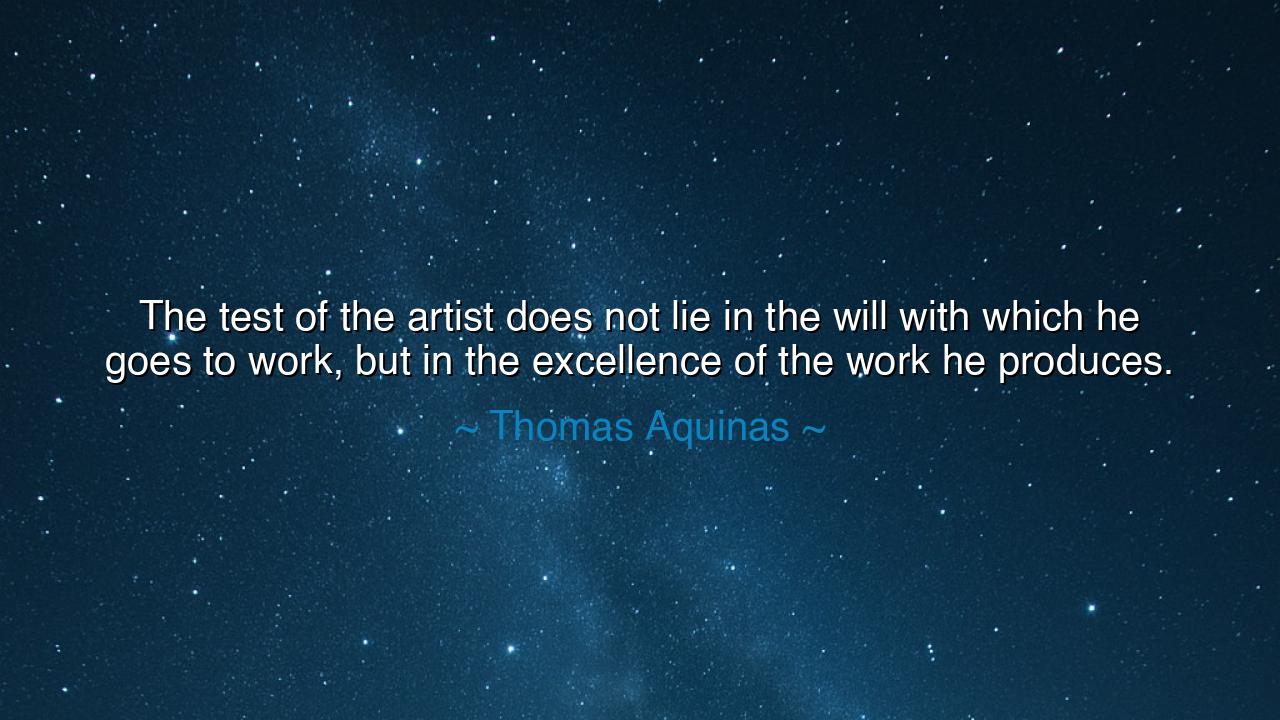
The test of the artist does not lie in the will with which he
The test of the artist does not lie in the will with which he goes to work, but in the excellence of the work he produces.






In the words of the philosopher, “The test of the artist does not lie in the will with which he goes to work, but in the excellence of the work he produces.” Thus spoke Thomas Aquinas, the great thinker whose wisdom bridged the realms of faith and reason. His saying reminds us that intention alone is not the crown of creation, but that the true measure lies in the fruit brought forth into the world. The spirit may burn with noble will, but without the shaping of excellence, the fire leaves no lasting light.
The meaning is clear: the artist is not judged merely by desire or effort, but by the beauty, truth, and power embodied in the finished work. Many may labor, and many may wish to create, yet it is only those who bring forth works of enduring excellence who prove themselves. For the world does not remember the striving of hands unfulfilled, but it does remember the song, the painting, the carving, the thought that carries timeless worth.
The origin of this teaching lies in Aquinas’s devotion to order, harmony, and the pursuit of perfection. Living in an age where both craft and contemplation were revered, he saw that true greatness does not spring from effort alone, but from the union of intention, discipline, and mastery. His words echo the eternal law of creation: that noble beginnings must be sealed with noble ends.
To the generations who follow, the lesson is stern but liberating. Do not boast of effort without fruit, nor believe that desire alone makes greatness. Strive, yes, with all the force of your will, but let your striving be proven in what your hands and mind bring forth. For in the final measure, it is not the worker’s will, but the work itself, that stands as witness before time and eternity.






TThy
I really resonate with the idea that the true test of an artist lies in the excellence of their work rather than just their effort. But this also raises the question—what does ‘excellence’ mean? Is it subjective? And can an artist’s true talent be seen only after a piece is completed, or is it a reflection of the entire creative process?
HTMai Hanh Tran
Thomas Aquinas' quote offers an intriguing perspective on the relationship between effort and outcome. The idea that an artist’s value is determined by the excellence of their work, rather than the effort they put into it, could be seen as harsh. Do you think this viewpoint undermines the struggle artists often face during the creative process? Should we not also appreciate the journey, not just the final product?
Mminhlikechess
This quote makes me think about how we often judge artists by their dedication rather than the quality of their work. It brings up an interesting question—does sheer effort justify the outcome, or should we be more focused on the finished product? How can artists balance their creative process while ensuring their work meets high standards of excellence?
NHNguyen Hien
Aquinas' statement is a strong reminder that while passion and effort are important, the quality of the end result is what truly defines an artist. Do you think that in today’s world, where creativity is highly valued, we sometimes overemphasize the process and forget that the finished work is what leaves a lasting impact? What do you think is more important, the journey or the destination?
MDnguoi mat dau
Thomas Aquinas’ quote challenges the common assumption that the effort put into work is the true measure of an artist’s talent. Instead, he emphasizes the importance of the final product—its excellence. Do you think this perspective devalues the process of creation, or is it a necessary reminder that results should always reflect the effort? How does this mindset apply to other fields outside of art?